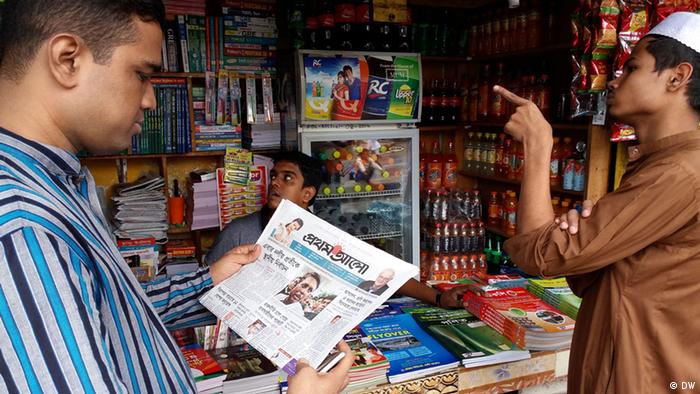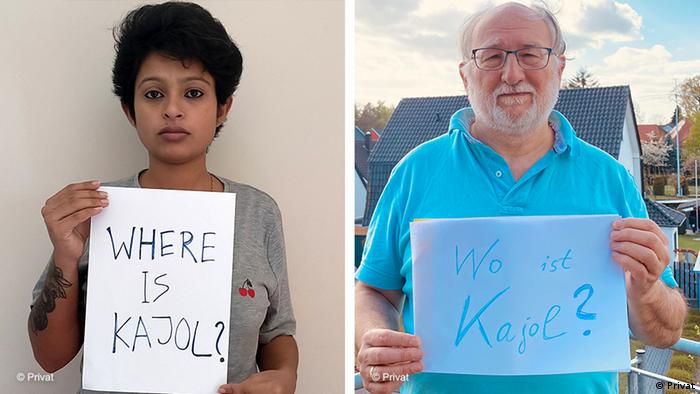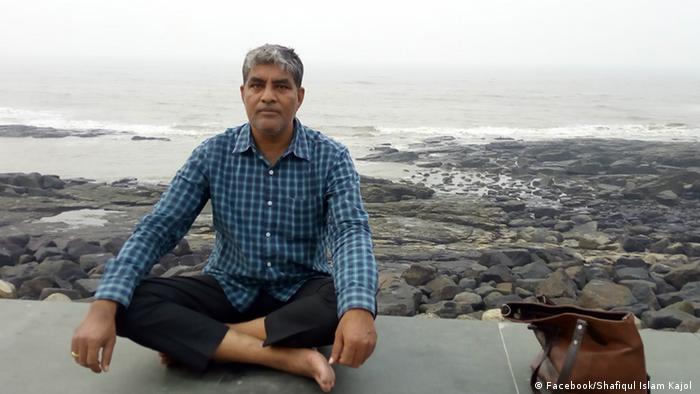Bangladesh: No respite in attacks, intimidation, and arrests in coronavirus crisis
More than a month ago, a Bangladeshi journalist disappeared without a trace after reporting on a government scandal. Bangladesh has a track record of media oppression and ranked 151 in the 2020 RSF ranking.
Bangladeshi editor and photojournalist Shafiqul Islam Kajol disappeared 42 days ago, and his fate remains unknown despite an international campaign by rights activists to find him.
His disappearance is symbolic of Bangladesh's ongoing crackdown on free speech under a draconian "fake news" law called the Digital Security Act. Since Kajol's disappearance, four other editors and journalists have been charged with various offenses under the act.
In the 2020 World Press Freedom Index released Tuesday by Reporters Without Borders (RSF), Bangladesh came in at 151 out of 180 countries, which is one point below last year's ranking. In the index, RSF said it noted a "disturbing increase in press freedom violations, including violence by political activists against reporters in the field, the arbitrary blocking of news websites, and arbitrary arrests of journalists."
Kajol is an outspoken critic of Bangladesh's ruling Awami League party. The day before he went missing, he was charged under the act, having been targeted for a report linking an Awami lawmaker to a Dhaka escort service.
The editor was last seen in CCTV footage released by Amnesty International showing him leaving his office in Dhaka on the evening of March 10. The footage also showed people tampering with Kajol's motorcycle while he was in the office and running behind him after he rides off.
While experts consider it as strong video evidence that could be used to trace what happened to Kajol, the police have reportedly downplayed it. "We have sent the video footage to the police to find my father last month. But the investigative officer later told me that they hadn't found anything suspicious in the footage," Kajol's son, Manaram Palok, told DW.
"All I can say confidently is that my father has been abducted. And, we want police to find and return him to us."

In the 2020 World Press Freedom Index released Tuesday by Reporters Without Borders (RSF), Bangladesh came in at 151 out of 180 countries
Gone without a trace
When contacted by DW, the lead investigator of Kajol's case said that he has not received any updates about the missing journalist. However, the official told local media that Kajol's mobile phone was briefly switched on in Benapole, a Bangladeshi town near the border with India on April 9, but police did not conduct an operation in the area due to lack of time and resources.
Meanwhile, an online campaign using the twitter hashtag #WhereIsKajol has been launched by journalists and activists to put pressure on the Bangladeshi authorities to find Kajol. Many people have posted pictures on social media with placards like "Where is Kajol?" printed on them.
"I strongly demand Kajol's safe return," Dil Afrose Jahan, an investigative journalist based in Dhaka, told DW. "The online campaign is not only for him, but it's also for all of us who are in this profession. We have to fight to protect ourselves, and we have to give ourselves a voice first."
Forced disappearances
Sofia Karim, an activist based in London, has been campaigning online to find Kajol since his disappearance. She said that the reluctance of police to find Kajol indicates that he might be another victim of forced disappearances in Bangladesh.
"Bangladesh has a track record of forced disappearances, and this case is disturbing and sinister," Karim told DW. "I feel for Kajol's family. This is unjust. It is our duty to speak out. We are talking about someone's life," she added.

An online campaign using the Twitter hashtag #WhereIsKajol has been launched by journalists and activists to put pressure on the authorities to find Kajol
Bangladeshi authorities have a history of being involved in arbitrary detentions and forced disappearances. Enforced disappearances have mushroomed in the country since Shiekh Hasina took power in 2009, according to rights groups.
The country's security forces have forcibly disappeared over 550 people over the past decade, according to local human rights organization Odhikar. This number includes many rights activists suspected to have been abducted by security agencies.
"The failure to reveal the whereabouts of Shafiqul Islam Kajol after more than a month is a disturbing display of the lack of empathy shared by the authorities with victims and their families," Saad Hammadi, a South Asia campaigner for Amnesty International, told DW.
More journalists charged
Meanwhile, four editors and journalists were charged on Saturday after a complaint filed by a ruling party leader under the Digital Security Act. They had been reporting on alleged embezzlement of aid for coronavirus victims from a district in Bangladesh.
Online newspaper editors Toufique Imrose Khalidi, and Mohiuddin Sarker, as well as local journalists Tanvir Hasan, and Rahim Shubho, were charged with the "publishing of offensive, false, defamatory, or fear-inducing data or information." Khalidi runs Bangladesh's most popular online news website, bdnews24.com.
Hasan claimed that the lawsuit was filed to muzzle journalists so that they avoid reporting on corruption committed by ruling party politicians. "Police have acted swiftly in taking on the case. It's an attempt to stop us from writing about corruption," he told DW.
Human rights experts have said the Digital Rights Act is draconian and demanded that the law be abolished since it was enacted in 2018. They said that the measure can be used to systematically muzzle journalists and rights activists.
"When journalists are accused of criminal charges for performing their professional duties, this means that the state is defining a boundary beyond which no one is eligible to exercise their right to freedom of expression," said rights activist Saad Hammadi.
"Some of the provisions of the Digital Security Act are vague, highly repressive because of the harsh punishment they entail, and in violation of international human rights law."
Bernhard Hertlein, a German journalist and rights activist, told DW that the "draconian" law targets everyone from journalists to ordinary citizens. "Even doctors who write about the danger of the coronavirus on Facebook face charges under the law. It should be abolished," he said. #
Joy Manush! Humanity First!
+1-718-713-4364 ePhone
+1-863-774-1849 eFax
Email:forumforFEXB@gmail.com
Twitter: @saleemsamad
Skype: saleemsamad
Facebook: https://www.facebook.com/saleem.samad
Blog: http://bangladeshwatchdog.blogspot.com/
__._,_.___
